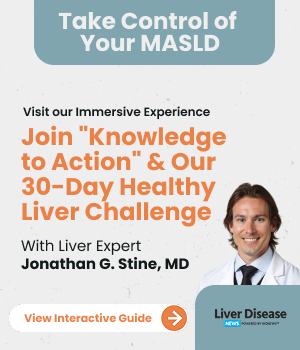Protecting your liver: Why screening tests are important
Last updated June 6, 2025, by Agata Boxe

Your liver is a powerful organ that plays a key role in many vital tasks, like helping your body digest food and removing harmful toxins. Liver disease, such as fatty liver disease or cirrhosis, disrupts these tasks and can impact your overall health.
If you’ve been diagnosed with liver disease, regular liver screening tests can help keep track of your condition and support your liver health, offering reassurance and a proactive approach to living with the disease.
Why are liver screening tests important?
Screening tests help detect potential liver problems early, allowing for timely treatment to help prevent them from getting worse. These tests play a key role in chronic liver disease management and keeping your liver as healthy as possible.
For example, an alcohol-related liver disease screening can help your doctors detect problems before they get too serious. This allows you to make lifestyle changes to prevent the disease from progressing.
For those at an increased risk of cirrhosis, or irreversible liver scarring (fibrosis), regular screening tests for cirrhosis detection can help your doctor monitor your disease, determine how you are responding to treatment, and detect any potential changes.
For those who may have liver cancer, early detection is also vital for improving survival outcomes.
Common types of liver screening tests
Liver screening tests can involve blood tests, imaging scans, and other medical tests.
Your doctor may suggest blood tests, such as liver function tests, which measure the levels of certain substances in your blood that are made by the liver. Some of these tests measure levels of liver enzymes, including:
- alanine aminotransferase (ALT)
- aspartate aminotransferase (AST)
- alkaline phosphatase (ALP)
- gamma-glutamyl transferase (GGT).
A test of your ALT levels and AST levels can help detect liver inflammation or liver damage. Meanwhile, ALP tests and GGT tests can help identify problems with your bile ducts.
Your doctor may also order a bilirubin level test, which measures a waste product made by the liver, to help understand how well your liver is functioning. A test of prothrombin time (PT) examines how long it takes your blood to clot. Most clotting factors are made in the liver, so a healthy liver is crucial for normal coagulation.
Some of these tests are included as part of a comprehensive metabolic panel (CMP), a routine test that measures the levels of 14 different substances in blood samples.
Your doctor may also recommend:
- imaging tests, such as liver ultrasound imaging, which is a noninvasive way of screening for liver diseases such as cirrhosis, fatty liver, and cancer
- viral hepatitis testing, including hepatitis A and hepatitis B screening tests, that detect viral infections that can cause liver inflammation and damage
- fibrosis assessment tests, such as a liver biopsy, a procedure that collects a sample of liver tissue for analysis, or an elastography, which measures the stiffness of the liver during imaging scans using low-frequency sound waves.
When to get screened
Your screening schedule will depend on your exact liver disease, your medical history, and other considerations.
Your health provider may recommend regular screenings if you have a known liver condition or liver disease risk factors, such as a family history of liver disease.
For example, people with cardiometabolic risk factors such as diabetes or high blood pressure have a greater risk of developing metabolic dysfunction-associated steatotic liver disease, formerly known as nonalcoholic fatty liver disease (NAFLD). In those cases, undergoing liver screening tests can help to detect the disease early.
For those in the general population, routine blood work done during an annual physical exam can reveal issues with liver function.
How screening tests support your health journey
Regular liver health monitoring is key to managing your liver disease. It can provide your doctor with invaluable information needed to create or adjust your treatment plan.
Facing an abnormal result can admittedly be stressful. But it is always better to catch issues early and get them treated before they potentially get worse.
And such results don’t always mean bad news. Sometimes elevated levels of certain substances in your blood may be a temporary response to a new medication or other factors — another reason why it is always wise to consult your doctor regarding how to interpret your test results.
Overall, regular testing matters because it helps your healthcare team make informed decisions about the best course of treatment for you.
Tips for managing emotions around testing
As beneficial as regular testing is for your health, waiting for results can cause you to feel anxious, typically because you don’t know what the tests may reveal.
Approaching your doctor with questions and concerns may help ease some anxiety. Your healthcare team will be able to tell you what to expect, how long it will take to receive your results, and, eventually, how to interpret them.
In addition to talking to your doctor or a specialist, talking to a family member or a friend can provide emotional comfort. Peers with liver disease can also offer advice and empathy. You can meet some of them in the Facebook group of Liver Disease News.
Finally, remind yourself that the more information your healthcare team has, the more effective your treatment can be. By providing essential information to your doctor, regular testing can benefit your long-term well-being.
Liver Disease News is strictly a news and information website about the disease. It does not provide medical advice, diagnosis, or treatment. This content is not intended to be a substitute for professional medical advice, diagnosis, or treatment. Always seek the advice of your physician or other qualified health provider with any questions you may have regarding a medical condition. Never disregard professional medical advice or delay in seeking it because of something you have read on this website.
Recent Posts
- Eating healthy over the summer is vital with liver disease
- Recurrent ICP linked to condition’s severity in 1st pregnancy
- Learning to worry a little less as we stick to our son’s care plan
- Pemvidutide shows benefit for MASH in Phase 2b clinical trial
- Prenatal ultrasound AI analysis IDs biliary atresia before birth in study






